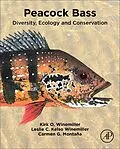Peacock Bass: Diversity, Ecology, and Conservation is a unique scientific reference that describes not only the diversity and natural history of the various peacock bass species (fish in the genus Cichla) but also their geographic distributions, evolutionary relationships, ecology, and economic importance. Peacock bass are the most popular sport fish pursued by recreational anglers in tropical freshwaters, and they support important fisheries in rivers and lakes in their native South America as well as other regions of the world where they have been introduced. The book is written in clear prose that allows any reader to appreciate key features of the morphology, population genetics, and reproductive biology of these colorful tropical freshwater fish. Each chapter begins with a vignette introducing an aspect of peacock bass taxonomy, ecology, or conservation based on a personal account from one of the authors. Also included are color photographs of peacock bass, their habitats, other tropical fishes, and the diverse wildlife encountered in rivers and forests of the Neotropics. Photographic guides and detailed descriptions of coloration patterns are provided for species identification, along with distribution maps and essential information related to fisheries management and the economic importance of peacock bass. Biologists interested in zoogeography and the ecological role peacock bass play as major predators in biodiverse rivers and lakes will find summaries of the latest information. Peacock bass have grown in popularity among aquarists, and the book provides basic information about captive care and environmental conditions in their natural habitats. This book is essential reading for biologists, fisheries managers, anglers, naturalists, and aquarists interested in these remarkable fish and the diverse tropical rivers they inhabit.
- Includes beautiful color photographs taken during field research
- Presents research vignettes to engage both scientists and laypersons
- Discusses feeding, cannibalism and effects on food webs
- Provides field maps and diagrams
Autorentext
Kirk O. Winemiller is an American ecologist, known for research on community ecology, life history theory, food webs, aquatic ecosystems, tropical ecology and fish biology. A strong interest has been convergent evolution and patterns, causes and consequences of biological diversity, particularly with respect to fishes. His research also has addressed the influence of hydrology on the ecological dynamics of fluvial ecosystems and applications of this knowledge for managing aquatic biodiversity and freshwater resources in the United States and other regions of the world. He currently is a University Distinguished Professor and Regents Professor at Texas A&M University and an Elected Fellow of the Ecological Society of America, American Fisheries Society and the American Association for the Advancement of Science. Winemiller has produced more than 240 scientific papers and 25 book chapters on topics ranging from food web ecology to the evolutionary ecology of fishes and heads the Winemiller Lab
Klappentext
Peacock Bass: Diversity and Natural History of Tropical Predators is a unique reference that not only describes the diversity and natural history of the species, but also its ecology and socioeconomic importance. The book is written in an easy to follow language, allowing readers at any level to understand morphology, genetics and evolutionary relationships. Fundamental information on the peacock bass species is provided, including its ecological role, diversity and fisheries management. As the popularity of peacock bass as aquarium fishes has increased, biologists are interested in the important ecological role they play as top predators in biodiverse rivers and lakes.
This book is essential to fisheries scientists, managers and conservationists in commercial and subsistence fisheries, but will also be of value to biologists.
- Includes beautiful color photographs taken during field research
- Presents research vignettes to engage both scientists and laypersons
- Discusses feeding, cannibalism and effects on food webs
- Provides field maps and diagrams
Inhalt
1. The alluring peacock bass
2. Butterfly peacock bass, Cichla ocellaris
3. Orinoco butterfly peacock bass, Cichla orinocensis
4. Royal peacock bass, Cichla intermedia
5. Speckled peacock bass, Cichla temensis
6. Pinima peacock bass, Cichla pinima
7. Blue peacock bass, Cichla piquiti
8. Xingu peacock bass, Cichla melaniae
9. Fire peacock bass, Cichla mirianae
10. Falls lukunani, Cichla cataractae
11. Evolutionary relationships and zoogeography
12. Fisheries, captive care and conservation
